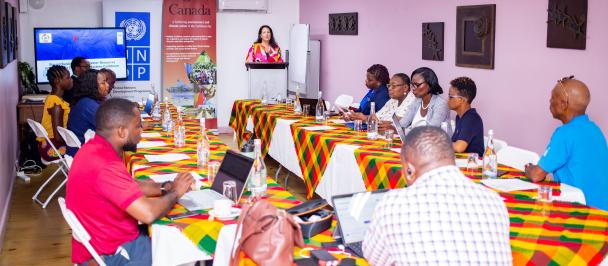Photo: UNDP/Zaimis Olmos
The countries of the Eastern Caribbean are at a pivotal point in the region’s development history; one in which its people are facing unprecedented social, environmental, and economic challenges – headlined by the accelerating global threat of climate change and the uncertainty of the COVID-19 pandemic
Three of the seven countries in the Eastern Caribbean are classified as having high or extreme climate exposure risk and these have already started turning into devastating impacts. Damages from major hurricanes over the past 5 years have topped USD 12 billion and current projections suggest that damages from winds, storm surge and inland flooding due to tropical storms could reach as much as 9% of regional GDP by 2030. These risks have been compounded by the COVID-19 pandemic which has cost the region hundreds of lives, shattered livelihoods for countless of the most vulnerable, and erased decades of development gains.
These challenges exacerbate longstanding structural issues facing the region, including narrow economic bases, high dependence on few, vulnerable economic sectors, lack of economies of scale, high crime and lagging judicial sectors, limited fiscal space and high indebtedness.
The 2022-2026 Country Programme for Barbados and the Eastern Caribbean is the United Nations Development Programme’s (UNDP) ambitious response to these challenges. It is designed to support countries’ efforts to harness the immense potential of their people, to achieve their sustainable development goals. The 5-year programme, which has been designed in collaboration with national and community-level stakeholders from across the region, applies three UNDP global Strategic Plan approaches focused on accelerating structural transformation, particularly green, inclusive and digital transitions; promoting equitable access to opportunities and a rights-based approach to human agency and human development; and building resilience to respond to systemic uncertainty and risk.
To achieve this, we must leverage the knowledge of our past within the context of future realities. As such, the programme builds on the lessons learned from UNDP’s partnership and support to countries in the region over the past half-century and intentionally responds to both current and emerging challenges through a participatory, systems-based approach and is driven by strategic innovation, digitalisation, and mobilisation of new forms of sustainable development financing.
But the plan is the starting point – in order to encourage the required changes necessary for a more resilient Caribbean, UNDP will work with development partners, the local financial services sectors and the international finance community to enhance national capacities and the access of small businesses and governments to sustainable financing for shock responsive, gender-responsive digital transformation and blue economy development. Under the new programme, UNDP will leverage its expertise in disaster risk management and response to enhance the capacities of national and regional disaster risk management agents, for disaster recovery planning and intervention and to deploy and strengthen integrated, gender responsive disaster preparedness systems. The climate is dramatically changing and to thrive, the Caribbean must respond in kind.
The Country Programme further paves the way to resilience and will also focus on mitigation and adaptation to climate change by supporting countries’ energy transition priorities and their conservation goals. It will support countries in achieving their goals of enhanced access to affordable, reliable and sustainable energy through a combination of incubation, investments at scale, institutional strengthening and policy support. We will work with local and regional academia, stakeholders in the agricultural and fisheries sectors and civil society to strengthen the capacities of duty-bearers and empower rights-holders to adapt to and mitigate the impacts of climate change as well as promote gender-responsive natural resource planning, data collection, analysis and management.
But the climate is not the only changing issue that the Caribbean must face. We must respond to perennial forms of crime, and new challenges for the region such as trafficking in persons and constraints that hinder equitable and efficient access to justice. We must evolve and support countries in deploying new technologies, enhanced skills, and innovative tools to improve governance, crime data management, crime response management and coordination.
While the new Country Programme acknowledges that the challenges ahead are daunting, it represents a conviction that they are not insurmountable. As we enter this new programme cycle, the Country Programme embodies UNDP's commitment to our local, national, and regional partners to collectively pursue new opportunities for tackling structural inequalities, and to strive to meet the ambitions set out in the 2030 Agenda. As we strive to effect positive change in the Caribbean, with the countries and people we serve, we reflect on our vision of development as freedom and we renew our focus on empowering people, protecting the planet, strengthening partnerships, promoting peace and catalysing prosperity for all.
Jason LaCorbiniere
Head of Cluster
Poverty, Governance and Monitoring and Evaluation
UNDP Barbados and the Eastern Caribbean

 Locations
Locations




